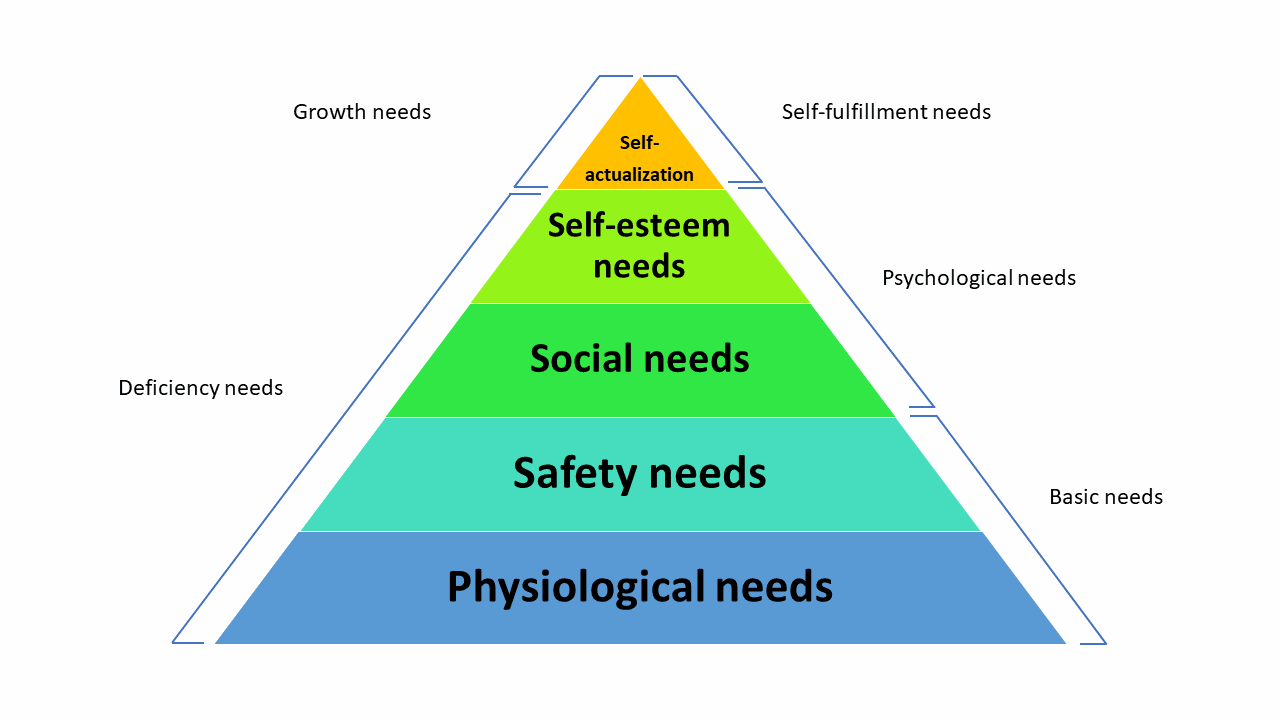I recently held a talk on the topic of paradigm shift in talent recruitment at a international online conference called #HRDay The New Normal. The topic headline was “BEFORE: recruit and select. AFTER: attract and sell.”
On that occasion, I presented a concept that I called "the candidate's life project" and talked about its impact on the selection process. For those who have not had the opportunity to participate, here is an opportunity to meet.
Back in 1943, Abraham Maslow presented a hierarchy of human needs in the article "Theory of Human Motivation". The model is presented in the shape of a pyramid with the basic needs at the bottom, and the highest needs at the top.
Maslow hierarchy of needs

Maslow's hierarchy of needs has been criticized, evaluated as culturally determined and therefore cannot be universal. The logical or hierarchical order really differs from culture to culture, which makes Maslow's model no less universal.
If we were to add just one more dimension to the Maslow's hierarchy of needs - TIME - this model irresistibly reminds us of the LIFE of everyone. Some elements of our life are given to us by birth (physiological needs), and on other elements of our life we must make efforts to make our life look the way we imagined it. Yes, some people do not notice the needs of higher levels or do nothing to fulfill them. However, those who see these needs, know that achieving the desired outcome that we have set for ourselves, is a serious project - a life project!
Life project and priorities!
Yes, each responsible individual will design their own life project, plan, and define priorities according to needs and current life stage. However, there are things that we cannot influence in life, and we have not in any way contributed to them happening. These are circumstances such as major economic crises, or pandemics, and they inevitably affect the change of our priorities and plans. Consequently, Maslow's hierarchy of needs is not determined only by cultural differences.
Life project and human capital
If you follow what is happening in the area of human capital management, or you are just its end user, you will realize that most HR strategies are focused on higher levels of Maslow's hierarchy - the need to belong ("informal and friendly environment, dynamic teams"), the need for respect ("challenging projects, opportunities for personal development in the form of training and coaching ") and the need for self-actualization (" possibility of advancement, share options… "). Why is it so? Because the higher parts of Maslow's hierarchy are the need for growth and development, ie. motivational factors, which assume that physiological and safety needs are already met.
However, as people's needs change over time, so have human capital management approaches. When it became important for people to make a balance between business and private life, HR started with initiatives that became part of corporate cultures, such as flexible work, work from home and the like. However, I think that the scope of insight and understanding the needs of the individual is not so wide from the perspective of organizations.
Currently, the society on a global level is in at extremely sensitive moment, and the very foundations of Maslow's hierarchy of needs have been shaken.
Millions of people in the world have already lost their jobs, and taking economic forecasts for the next few years into account, it would be utterly irresponsible to put pink glasses and imagine a "virtuous new world" that would be a better place to live and continue current practices, when mere survival and security, both health and job security are at stake?!
"Little upside-down cake"

Why will sales be important for the future of recruitment?
To
answer this question, it is necessary to know what makes a sales rep
successful. A sales rep is a person who can establish and develop a
relationship of trust in which he/she can probe to gain insight and
understand prospects current situation, goals, problems and needs.
Then, using effective communication techniques, the successful
salesperson connects the functionalities of his product, service, or a
solution with the needs of the customer and outlines the
advantages/benefits that the customer can achieve. A successful
salesperson is primarily a curious researcher and an excellent
communicator.
Now I am going to have to break the illusions of recruiters….
Currently,
the most common approach to recruitment and interviewing is based on
established and highly predictable methods. Of course, if there is one
thing I am advocating for, it is a proven method. However, the biggest
problem in the approach I see is that the recruiter does not show
genuine interest in the candidate's life project, but only tries to
identify the resources (experience, knowledge, skills) necessary to get
the job done.
If a person is a resource for
making profits for a company by doing his/her job, I see no reason why a
job/company should not be a resource for a better quality of life
outside of work to an employee.
I expect this
crisis to drastically change the attitude of candidates towards
potential employers, precisely because of the newly established
priorities in their lives.
Corporate culture,
employer branding, big names in the business world will only matter if
they are able to substantially support the life projects of each
individual.
Sweet-spoken, amusing and many times copied corporate slogans are coming to an end…
Life project becomes priority No.1!
It's nice that you have a carrot, but a human is a human, not a rabbit.
Everything that precedes job interview is marketing. A job interview is sales.
If
you think that the only needed change in the way of interviewing in the
future is using Zoom, then I wish you luck with your rabbit farm.
If you think you need to undertake significant changes in your process in the time ahead, and you need support, then
get in touch!
Dragan Vukosavljević
People development consultant